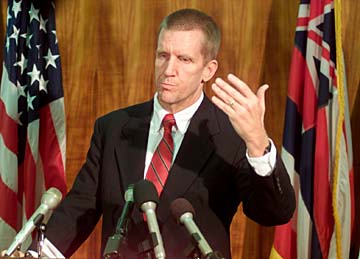


When Steve Alm talks about the work of the U.S. Attorney's Office over the past six years, he points to the cooperation between state and federal law enforcement. Alm to be sworn in
as state judge todayHe leaves behind a
By Debra Barayuga
distinguished record
as federal prosecutor
Star-BulletinIt is not surprising, because ever since he became Hawaii's top federal prosecutor in October 1994, he has pushed for increased cooperation among law enforcement agencies as a more effective way of fighting crime.
After serving his entire career as a prosecutor, beginning with the city prosecutor's office in the mid-80s, Alm takes on a different role in the criminal-justice arena as he is sworn in as Hawaii's newest state judge today.
The ceremony happens at 4 p.m. in the State Supreme Court Courtroom at 417 S. King St.
His appointment fills a vacancy created when Circuit Judge Kevin Chang was appointed a U.S. magistrate. It is a role Alm looks forward to because of the respect he has for the criminal-justice system both on the state and federal side.
Hawaii has active police departments, good prosecutors and a very good public defender system that provides experienced legal counsel for those who cannot afford to hire a lawyer, he said.
"I always say people of Hawaii can be confident when they or their loved ones get arrested and enter the criminal-justice system."
Among the more notable cases prosecuted during his tenure was the first violation of federal campaign spending law by the late House Speaker Danny Kihano, followed by former Sen. Milton Holt.
More recently, his office presented evidence in a case to a federal grand jury, resulting in an indictment against City Councilman Andy Mirikitani for allegedly taking kickbacks from two of his aides.
A federal grand jury also indicted longtime UPW Director Gary Rodrigues on fraud, embezzlement and money-laundering charges for allegedly skimming more than $200,000 from two union health plans.
The U.S. Attorney's Office tried as much as possible to target criminal organizations rather than individuals, Alm said.
The office works with the Drug Enforcement Administration; IRS; Customs; the Bureau of Alcohol, Tobacco and Firearms; and Honolulu police to go after drug organizations operating here.
Their efforts have put a dent in at least two large heroin and cocaine operations on Maui in the past year and numerous "ice" rings on Oahu.
Among the largest drug organizations prosecuted was one headed by drug kingpin Frank Moon. Moon, along with 40 to 50 conspirators, distributed 100 to 200 pounds of crystal methamphetamine and about 200 pounds of cocaine in the early 1990s.
About 30 defendants in that case, the last in 1997, netted prison terms ranging from five to 22 years. Also convicted in the case was police officer Alfredo Villanueva Jr., who received 20 years for taking bribes in exchange for passing on confidential police information to Moon and Honolulu attorney George Parker, who received 13 years' imprisonment for offenses linked to Moon. Federal prosecutors were able to convict the first person here to be prosecuted under a 1986 federal law targeting makeshift drug labs.
The Crosspointe resident was convicted for cooking crystal methamphetamine at his townhouse but got caught after firefighters responded to reports of smoke billowing from the building's roof vents.
In a high-profile gambling investigation, isle comedian Mel Cabang, who ran one of the largest sports betting operations in the state between 1991 to 1995, received 51 months in prison.
One example Alm cites of the cooperation between state and federal law enforcement agencies was a case a few years ago involving a series of violent "drive-by" purse-snatchings in Waikiki.
The Japan consul general had written to Honolulu's mayor, threatening to stop Japan travelers from coming here if the thieves were not caught.
Honolulu police and the FBI worked together to identify a core group responsible. Using a federal statute governing crimes affecting interstate commerce, U.S. prosecutors convicted 14 individuals, one of whom received the longest sentence of 13 years. The activity "virtually stopped," Alm said.
Alm's tenure as U.S. attorney marked a period of "very high levels" of cooperation between law enforcement agencies, which has not always been the case, said city Prosecutor Peter Carlisle.
While Alm gets much satisfaction in working with other agencies to hold individuals accountable for their crimes, much of his involvement comes after the crime has been committed, he says.
That is why of all the projects he has undertaken, none is closest to his heart than the Weed and Seed program in the Kalihi/Palama/Chinatown area.
The program, begun in 1998, looks for ways to prevent crime and improve communities by getting residents, law enforcement and social service agencies to work together to identify and solve problems proactively.
In the Weed and Seed district, violent crimes including murder, rape, robbery and aggravated assault went down 75 percent last year, compared to 1997, successes Alm attributes to the program.
The program has been so successful in targeting problems identified by residents that another Weed and Seed program has been started in Waipahu.
"It's very exciting for me to take something that works to more communities," Alm said.